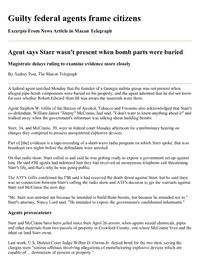
Guilty federal agents frame citizens PDF
Preview Guilty federal agents frame citizens
Guilty federal agents frame citizens Excerpts From News Article in Macon Telegraph Agent says Starr wasn't present when bomb parts were buried Magistrate delays ruling to examine evidence more closely By Audrey Post, The Macon Telegraph A federal agent testified Monday that the founder of a Georgia militia group was not present when alleged pipe-bomb components were buried on his property, and the agent admitted that he did not know for sure whether Robert Edward Starr III was aware the materials were there. Agent Stephen W. Gillis of the Bureau of Alcohol, Tobacco and Firearms also acknowledged that Starr's co-defendant, William James "Jimmy" McCranie, had said, "I don't want to know anything about it" and walked away when the government's informant was talking about building bombs. Starr, 34, and McCranie, 30, were in federal court Monday afternoon for a preliminary hearing on charges they conspired to possess unregistered explosive devices. Part of [the] evidence is a tape-recording of a short-wave radio program on which Starr spoke, that was broadcast two nights before the defendants were arrested. On that radio show, Starr called in and said he was getting ready to expose a government set-up against him. He said FBI agents had informed him they had received an anonymous telephone call threatening Starr's life, and that's why he was going public. The ATF's Gillis confirmed the FBI said it had received the death threat against Starr, but he said there was no connection between Starr's calling the radio show and ATF's decision to get the warrants against Starr and McCranie the next day. "Mr. Starr was arrested not because he intended to build those bombs, but because he intended not to," Starr's attorney, Nancy Lord said. "He intended to expose the government's confidential informants." Agents provocateurs Starr and McCranie have been jailed since their April 26 arrests, when agents seized chemicals, pipes and other materials from two parcels of property in Crawford County, one where McCranie lives and the other on land Starr owns. Last week, U.S. District Court Judge Wilbur D. Owens Jr. denied bond for the two men, saying the charges were "serious offenses involving allegations of manufacturing explosive devices which are capable of ... destruction of persons or property." As more than 50 people packed the courtroom Monday, some leaning against the back wall, defense attorneys used what is often a quick, routine proceeding to attack the core of the government's case. "This is beyond entrapment," Lord said. "It is manufactured evidence. The materials were put on Mr. Starr's property without his knowledge." "The whole evidence upon which this case was based was fraudulent," she said. Lord contended that the government's confidential informants were actually "agent provocateurs," instigators sent to infiltrate and set up the 112th Battalion of the Militia-at-Large for the Republic of Georgia. Lord said it was the "agent provocateurs" who actually buried the pipes and chemicals on Starr's property, which made it easy for agents to find them when they got a search warrant. "You went right to it. You didn't have to search the whole 16 acres, did you?" Lord asked. Gillis conceded agents did not. Defining conspiracy Prosecuter Sharon Ratley objected repeatedly, and the judge agreed, when Lord questioned the agent about whether anyone other than Starr and the government's confidential informants took part in discussions or activities concerning pipe bombs. Ratley's position was that answering the questions would reveal the identity of the informants. Lord argued that there is no conspiracy against the government when all the participants but one are government agents. Prosecutors contended that other people besides Starr and the informants were present during bomb discussions, as well as when the pipes and chemicals were moved. However, under Lord's questioning, Gillis acknowledged that he had no way of knowing from a confidential informant's tape-recording whether the group was talking about bombs or survival gear when members talked about needing supplies. Lord finally persuaded the judge to allow the agent to asnwer one question about confidential informants. Gillis had just testified that someone other than the government's informants had shown up at McCranie's place the day the materials were to be moved to Starr's property -- which would have met the legal definition of a conspiracy. When Lord asked Gillis whether the other militia member actually participated in moving the materials, Ratley objected, again citing the need to protect identities. "With all due respect, the identity has been revealed," Lord told the Judge. Hodge instructed the agent to answer. "I don't know what the other individual did," Gillis said. One of McCranie's attorneys, Brian Randall, also coaxed Gillis into an admission that the government has no way of knowing exactly what materials were on McCranie's property before they were moved to Starr's land. Gillis testified that the informant said McCranie was present when the material was moved, but he also acknowledged that he had no way to dispute the defense argument that McCranie wanted the stuff moved because he wanted no part in bomb-making. [End of article excerpts] From: Helen Johnson,
